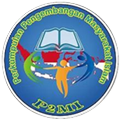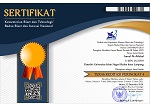CONSTRUCTING INTERFAITH HARMONY THROUGH THE DA’WAH OF KH. MAHFUD RIDWAN IN SEMARANG, INDONESIA
Abstract
Religious activists or da'i enlighten the mad'u (disciples) to coexist well and peacefully, require tolerant and wise da'wah, and convey the message of Islam as a mercy for all nature. However, the practice of da'wah is often faced with difficulties and obstacles. To overcome these challenges, a person needs to understand the concept of state life that binds all people from various groups and social groups to prevent unexpected societal conflicts. The purpose of this research is to gain a better understanding of the condition of Semarang Regency society before and after KH. Mahfud Ridwan's preaching. In addition, this research will also analyze the role of da'wah in creating inter-religious harmony from 1984 to 2015. This research was conducted in a descriptive qualitative manner using a historical approach. Research data were obtained through observation, interviews, and documentation. The reduction, presentation, and conclusion drawing process was used to analyze the data, and triangulation was used for data validation. The results showed that the condition of the people of Semarang Regency had been better before KH. Mahfud Ridwan's preaching was better afterward. His preaching uses various methods, such as the bil hikmah method, using noble reasoning, wisdom, and a clean heart. Various social and religious organizations, including the NGO Yayasan Desaku Maju, Forum Gedangan, FSUB, and the SOBAT movement, preach based on this bill hikmah. KH also established Edi Mancoro Islamic Boarding School. Mahfud Ridwan benefits the community and forms santri with religious, national, and societal insights. The method of bil mau'idzah hasanah is by holding regular recitations, teaching in pesantren and madrasah, holding seven minutes sermons, and holding activities on Islamic holidays. The bil mujadalah method is used by discussing with people of various religions.
Keywords
Full Text:
PDFReferences
Arifinsyah, Arifinsyah, Safria Andy, and Agusman Damanik. “The Urgency of Religious Moderation in Preventing Radicalism in Indonesia.” ESENSIA: Jurnal Ilmu-Ilmu Ushuluddin 21, no. 1 (April 27, 2020): 91–108. https://doi.org/10.14421/esensia.v21i1.2199.
Azharghany, Rojabi, Abdul Adim, and Hae Ruli Rusdi. “Paradigma Dakwah Islam Kyai Dalam Kancah Politik Kekuasaan Pasca Kemerdekaan Di Indonesia.” Alhadharah: Jurnal Ilmu Dakwah 21, no. 2 (2022): 1–17.
Basit, Abdul. “Dakwah Cerdas Di Era Modern.” Jurnal Komunikasi Islam (Journal of Islamic Comunication) 3, no. 1 (2013): 76–94.
Budiman, Dadang. “Dakwah Pada Masyarakat Terasing Upaya Dewan Dakwah Islam Indonesia (DDII) Terhadap Suku Akit SondeRiau.” Anida (Aktualisasi Nuansa Ilmu Dakwah) 18, no. 2 (2018): 181–94.
Curry, Oliver Scott, Daniel Austin Mullins, and Harvey Whitehouse. “Is It Good to Cooperate? Testing the Theory of Morality-as-Cooperation in 60 Societies.” Current Anthropology 60, no. 1 (2019): 47–69.
Devellennes, Charles, and Paul Matthew Loveless. “The Tolerance of the Despised: Atheists, the Non-Religious, and the Value of Pluralism.” International Political Science Review 43, no. 4 (2022): 580–94.
Fuad, Ai Fatimah Nur. “Da’wa and Politics: Lived Experiences of the Female Islamists in Indonesia.” Contemporary Islam 14, no. 1 (2020): 19–47.
Hartati, Ismail Nurdin dan Sri Hartati. Metodologi Penelitian Sosial & Pendidikan, 2019.
Hasnida, Hasnida. “Sejarah Perkembangan Pendidikan Islam Di Indonesia Pada Masa PRA Kolonialisme Dan Masa Kolonialisme (Belanda, Jepang, Sekutu).” Kordinat 16, no. 2 (2017): 237–56.
Hefni, Harjani. “Makna Dan Aktualisasi Dakwah Islam Rahmatan Lil ‘Alamin Di Indonesia.” Ilmu Dakwah: Academic Journal for Homiletic Studies 11, no. 1 (2017): 1–20.
Holmes, Emily A, Rory C O’Connor, V Hugh Perry, Irene Tracey, Simon Wessely, Louise Arseneault, Clive Ballard, Helen Christensen, Roxane Cohen Silver, and Ian Everall. “Multidisciplinary Research Priorities for the COVID-19 Pandemic: A Call for Action for Mental Health Science.” The Lancet Psychiatry 7, no. 6 (2020): 547–60.
Hwang, Julie Chernov, and Kirsten E Schulze. “Why They Join: Pathways into Indonesian Jihadist Organizations.” Terrorism and Political Violence 30, no. 6 (2018): 911–32.
Ihsani, A Fikri Amiruddin, Novi Febriyanti, and Abdan Syakuuroo SK. “Gus Dur’s Multicultural Da’wah and Its Relevance to Modern Society.” El Harakah 23, no. 1 (2021): 103.
Ismail, A Ilyas, and Badrah Uyuni. “The New Perspective of Interfaith Dialogue as Da’wah Approach in Global Era.” Journal of Xidian University 14, no. 3 (2020): 1540–52.
Kadomi, Muhammad Fairus. “Kyai Dan Politik: Peranan KH Mahfudz Ridwan Dalam Partai Kebangkitan Bangsa 1998-2008: Ulema and Politics: The Role of KH Mahfudz Ridwan in the National Awakening Party 1998-2008.” Journal of Islamic History 2, no. 1 (2022): 1–24.
Manullang, Sardjana Orba, Mardani Mardani, Prasetyono Hendriarto, and Aslan Aslan. “Understanding Islam and The Impact on Indonesian Harmony and Diversity: A Critical Analysis of Journal Publication 2010 to 2020.” Al-Ulum 21, no. 1 (2021): 68–88.
Muhyiddin, Ahmad Shofi. “Islamic Boarding Schools and Da’wah of Religious Moderation.” Alhadharah: Jurnal Ilmu Dakwah 22, no. 1 (2023): 85–99.
Mulyana, Deddy. Metode Penelitian Kualitatif. Bandung: PT. Remaja Rosda Karya, 2017.
Mundiri, Akmal, and Afidatul Bariroh. “Transformasi Representasi Identitas Kepemimpinan Kyai Dalam Hubungan Atasan Dan Bawahan.” Al-Idarah: Jurnal Kependidikan Islam 8, no. 2 (2018): 234–55.
Muyasaroh, Lailia. “Metode Tafsir Maudu’i (Perspektif Komparatif).” Jurnal Studi Ilmu-Ilmu Al-Qur’an Dan Hadis 18, no. 2 (2017): 163–88.
Nugrahani, Farida. Metode Penelitian Kualitatif. Solo: Cakra Books, 2014.
Nuris, Anwar. “Ahmad Dahlan Dan Pesantren: Gerakan Pembaharuan Pendidikan, Dakwah, Dan Pemberdayaan Masyarakat Di Indonesia.” Dirosat: Journal of Islamic Studies 1, no. 2 (2017): 243–58.
Nuruddin, Sabara, and Aksa Aksa. “Religious Harmony Through The Development Of House Of Worship Based On Local Genius In Kei Islands, Maluku.” Al-Qalam 28, no. 2 (2022): 279–92.
Ridho, Muhammad Ali, Andi Eka Putra, and Muhammad Jamil. “MAJELIS TAKLIM AND ITS ROLE IN WOMEN’S EMPOWERMENT.” Ijtimaiyya: Jurnal Pengembangan Masyarakat Islam 16, no. 1 (2023): 65–90.
Rizal, Derry Ahmad. “Pemberdayaan Berbasis Kemitraan Antara Pemerintah Dengan Kelompok Tani Tri Tunggal Wonorejo.” Jurnal Pemberdayaan Masyarakat: Media Pemikiran Dan Dakwah Pembangunan 1, no. 2 (2018): 343. https://doi.org/10.14421/jpm.2017.012-07.
Setiawati, Rini, Mubasit Mubasit, Muhammad Mawardi, and Ashadi Cahyadi. “PESANTREN AND ITS FUNCTION IN IMPROVING THE WORSHIP OF THE VILLAGE COMMUNITY.” Ijtimaiyya: Jurnal Pengembangan Masyarakat Islam 16, no. 1 (2023): 91–110.
Stanovich, Keith E, and Maggie E Toplak. “The Need for Intellectual Diversity in Psychological Science: Our Own Studies of Actively Open-Minded Thinking as a Case Study.” Cognition 187 (2019): 156–66.
Wahyuddin, Wawan. “Kontribusi Pondok Pesantren Terhadap NKRI.” Kajian Keislaman, 2016.
DOI: http://dx.doi.org/10.24042/ijpmi.v16i2.18064
Refbacks
- There are currently no refbacks.
Jurnal Ijtimaiyya is licensed under a Creative Commons Attribution-ShareAlike 4.0 International License.






1.png)
11.png)
.png)


